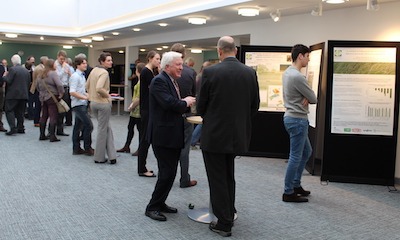
The BCPC Weed Review 2016 focussed on cover crops including an overview defining their role, practical growers perspectives (arable and horticultural) on their use for weed control and an environmental and seed producers view.
A set of talks was followed by an open debate/discussion section with an expert panel taking questions on this subject.
Other key topics include: soil drainage and weed control, the sustainability and weed implications of anerobic digestion, and the challenges of weed control within the amenity sector.
PhD students and other researchers had the opportunity to present posters on their current research
To access the speakers presentations please click on the presentation title for a pdf of the paper.
Outlook on Pest Management Report
Agenda
Morning session
10.00 Chairman’s introduction
Cover crops
10.20 – 10.50
1.1 Cover crops back to basics. Implications for weed control.
Paul Brown, Kings Seeds
10.50 – 11.10
1.2 Farmer perspective A – “Ten years of on-farm trial and error – discovering how not to grow cover crops.” Andrew Barr
Abstract: The history of my cover crop growing and pointers for better future on farm practice. My current thinking and experience on the effects on weeds and that of others in my local conservation tillage group. How I plan to maximise the potential weed control benefits of cover crops in the future.
I farm 450 of arable and environmental crops in Kent and work closely with my brother who farms sheep and cattle on a further 300 ha. I have been direct drilling since 2010 with minimum tillage for ten years prior to that and started experimenting with cover crops in around 2003. I am on the BASIS professional register, have a degree in Natural Sciences and have just completed a PGCert in Agrifood. I write a Farmer Focus piece in the Farmers Weekly, am a member of the BCPC Disease Group and the local HGCA Monitor Farm steering committee. I have previously been on the NFU Crops Board and HGCA Exports committee and also been the local NIAB TAG technical committee chairman.
11.10 – 11.30
1.3 Can cover crops aid weed suppression in horticultural crops? –
Angela Huckle, Horticulture Research Consultant (Vegetables), ADAS
Abstract: The benefits and challenges, and the practicalities of integrating cover crops into intensive horticultural production will be discussed, plus initial findings from a cover crop trial carried out with a commercial salad grower.
11.30 – 12.15
1.4 Panel debate on the subject
12.15 – 12.45
PhD students slot
Lunch 12.45 – 14.00
Afternoon session
14.00 – 14.30
Soil drains/health – Kirk Hill, Senior Consultant, ADAS
Abstract: A look at the principles, practices and benefits of maintaining good field drainage conditions and the role drainage plays in helping weed management and modern farming as a whole.
14.30 – 15.00
AD – sustainability of energy crops / weed control issues – Chris Gamble, DLF Seeds
Abstract: Some of the pros and cons to agriculture and crop rotations of AD plants – experience of farms that traditionally would have been growing wheat , rape, peas and beans in rotation have now been growing maize, hybrid rye, (beet) and high yielding short term grass leys. The subsequent effects on soil health , crop rotations and weed management experienced, including the effect of blackgrass seeds in the AD system will be commented on. The benefit energy crops bring to the rotation – specific links into weed control – cultural and chemistry – changed rotation to manage weed burdens etc . Harvest date challenges vs. grass weed maturity. Value of Digestate and sludge.
Currently Director of Agriculture with DLF, Seeds and Science. Formerly Cheminova, Canadian marketing manager and Global Portfolio Manager for herbicides. Over 27 years in Agriculture mostly in agronomy, sales and marketing concerned with the crop protection and seeds. I have maintained farm contact and field walking throughout my career looking at the interactions of rotations, nutrition, soil health, different enterprise interaction in integrated farm management.
15.00 – 15.30
Weed control challenges and practices – Dr. Neil Strong, Network Rail
Abstract: Network Rail’s infrastructure of 40,000 hectares is enclosed by approximately 32,000 kilometres of boundary fence. The management of this vast estate, the fourth largest in Britain, presents many challenges not least when control of weeds is required. The type and size of infrastructure does not lend itself to manual methods but the fact that the railway passes through every National Park in Britain, contains over 200 Sites of Special Scientific Interest, and passes within 500 metres of one-third of the population of Britain means that different and novel techniques may be employed. This paper will discuss the methods whilst explaining the constraints that exist when managing weeds next to trains running at up to 200 kilometres per hour.
Dr Neil Strong studied forestry and ecology as an undergraduate (Edinburgh) and a post-graduate (Portsmouth). He provides Network Rail expertise and support on aspects of the lineside asset including the management of vegetation and the impact on biodiversity; he has developed company standards on vegetation and fencing. His current focus is the sustainable management of the lineside necessary to improve the safety and biodiversity of the rail network.
15.30 – 15.45
Wrap up session